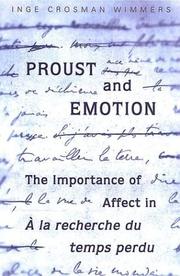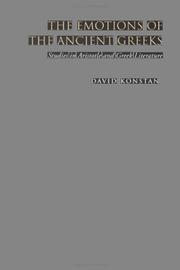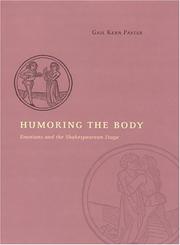| Listing 1 - 5 of 5 |
Sort by
|

ISBN: 0802087272 9786611996499 1442678860 1281996491 9781442678866 9781281996497 9780802087270 Year: 2003 Volume: *81 Publisher: Toronto, [Ontario] ; Buffalo, [New York] ; London, [England] : University of Toronto Press,
Abstract | Keywords | Export | Availability | Bookmark
 Loading...
Loading...Choose an application
- Reference Manager
- EndNote
- RefWorks (Direct export to RefWorks)
In Proust and Emotion, Inge Crosman Wimmers proposes a new approach to A la recherche du temps perdu that centres on the role of affect. Through close reading of the hero-narrator's personal history, the author shows how emotional paradigms (especially separation anxiety), involuntary memory, and other compelling impressions give focus and structure to Proust's novel. Drawing on reader-oriented and emotion theories, she shows how affect commands the attention of the 'motivated reader' and is crucial to the process of self-understanding for both the narrator and the reader. This is the first extensive study in English to take fully into consideration the drafts (esquisses) published in the new Pleiade edition of the novel, the Mauriac edition of Albertine disparue, and material from the unpublished Proust manuscripts - all of which shed further light on the importance of affect in A la recherche. Proust and Emotion will appeal to readers interested in an approach to Proust that combines insights from philosophy, psychology, and literary aesthetics and in a poetics of reading that pays particular attention to emotion.
Emoties in de literatuur --- Emotions dans la littérature --- Emotions in literature --- Esthétique de la réception --- Reader-response criticism --- Emotions in literature. --- Reader-response criticism. --- Reader-oriented criticism --- Reception aesthetics --- Criticism --- Reading --- Proust, Marcel, --- Criticism and interpretation. --- Proust, Marcel --- Criticism and interpretation --- Prust, Marselʹ, --- Proust, Valentin Louis Georges Eugène Marcel, --- Pʻŭrusŭtʻŭ, Marŭsel, --- Pʻu-lu-ssu-tʻe, --- Пруст, Марсель, --- פרוסט, מארסל --- פרוסט, מרסל --- ,פרוסט, מרסל --- بروست، مارسيل،, --- À la recherche du temps perdu (Proust, Marcel)
Book
ISBN: 9789004269293 9789004285576 9004285571 9004269290 1322630593 Year: 2015 Volume: 377 Publisher: Leiden, The Netherlands : Koninklijke Brill,
Abstract | Keywords | Export | Availability | Bookmark
 Loading...
Loading...Choose an application
- Reference Manager
- EndNote
- RefWorks (Direct export to RefWorks)
Emotion in Action: Thucydides and the Tragic Chorus offers a new approach to the tragic chorus by examining how certain choruses ‘act’ on their shared feelings. Eirene Visvardi redefines choral action, analyzes choruses that enact fear and pity, and juxtaposes them to the Athenian dêmos in Thucydides’ History . Considered together, these texts undermine the sharp divide between emotion and reason and address a preoccupation that emerges as central in Athenian life: how to channel the motivational power of collective emotion into judicious action and render it conducive to cohesion and collective prosperity. Through their performance of emotion, tragic choruses raise the question of which collective voices deserve a hearing in the institutions of the polis and suggest diverse ways to envision passionate judgment and action.
Drama --- Emotions in literature. --- Théâtre (Genre littéraire) --- Emotions dans la littérature --- Chorus (Greek drama) --- Choeur de théâtre grec --- Thucydides --- Criticism and interpretation. --- Criticism and interpretation --- Théâtre (Genre littéraire) --- Emotions dans la littérature --- Choeur de théâtre grec --- Chorus (Drama) --- Greek drama --- Chorus --- Thucydide --- Thukydides --- Thoukudides --- Drama - Chorus (Greek drama) --- Thucydides - Criticism and interpretation --- Tucidide --- Fukidid --- Tucídides --- Thoukydidēs --- תוקידידיס --- Θουκυδίδης
Book
ISSN: 15734188 ISBN: 9789004250826 9789004252936 9004252932 9004250824 1299735983 Year: 2013 Volume: v. 168 Publisher: Leiden ; Boston : Brill,
Abstract | Keywords | Export | Availability | Bookmark
 Loading...
Loading...Choose an application
- Reference Manager
- EndNote
- RefWorks (Direct export to RefWorks)
Emotions and Health, 1200-1700 examines the Aristotelian and Galenic understandings of the ‘passions’ or ‘accidents of the soul’ as alterations of both mind and body across a wide range of medieval and early modern cultural discourses: Aquinas’s Summa , canonization inquests, medical and natural philosophical texts, drama, and the London Bills of Mortality. The essays in this collection focus on notions such as death from sorrow, physiological explanations of fear, physicians’ advice on the harmful and beneficial effects of anger and of sex, medical and philosophical constructions of the melancholic subject, and theological and medical discussions on the impact of music in moderating the passions and maintaining health. Contributors include: Nicole Archambeau, Elena Carrera, Penelope Gouk, Angus Gowland, Nicholas E. Lombardo, William F. MacLehose, Michael R. Solomon and Erin Sullivan.
Thematology --- History of human medicine --- anno 1600-1699 --- anno 1200-1499 --- anno 1500-1599 --- Emotions --- Emotions in literature. --- Medicine and psychology --- Emotions dans la littérature --- Médecine et psychologie --- Early works to 1850. --- History --- Ouvrages avant 1850 --- Histoire --- Health aspects --- History. --- 61 <09> --- Behavioral medicine --- Psychology and medicine --- Psychology, Applied --- Feelings --- Human emotions --- Passions --- Psychology --- Affect (Psychology) --- Affective neuroscience --- Apathy --- Pathognomy --- Geschiedenis van de geneeskunde --- 61 <09> Geschiedenis van de geneeskunde --- Emotions dans la littérature --- Médecine et psychologie --- Emotions in literature --- Early works to 1850 --- Health aspects&delete& --- 61 <09> History of medicine --- History of medicine --- Health aspects. --- Social aspects. --- Emotions - Health aspects - History. --- Emotions - Early works to 1850. --- Medicine and psychology - History.

ISBN: 0802091032 9780802091031 0802095585 9786611992002 1442674377 1281992003 9780802095589 9781442674370 1442691182 Year: 2006 Volume: *2 Publisher: Toronto ; Buffalo, N.Y. : University of Toronto Press,
Abstract | Keywords | Export | Availability | Bookmark
 Loading...
Loading...Choose an application
- Reference Manager
- EndNote
- RefWorks (Direct export to RefWorks)
"It is generally assumed that whatever else has changed about the human condition since the dawn of civilization, basic human emotions - love, fear, anger, envy, shame - have remained constant. David Konstan, however, argues that the emotions of the ancient Greeks were in some significant respects different from our own, and that recognizing these differences is important to understanding ancient Greek literature and culture."--Jacket.
Emotions (Philosophy). --- Emotions in literature. --- Greek literature --- Émotions (Philosophie). --- Émotions dans la littérature. --- Littérature grecque --- History and criticism. --- Histoire et critique. --- Aristotle. --- Aristotle --- Psychology. --- Emotions in literature --- Emotions (Philosophy) --- Philosophy --- History and criticism --- Aristoteles --- Aristote --- Aristotile --- Aristoteles. --- Aristote. --- Et la psychologie. --- Emotions (Philosophie) --- Littérature grecque --- Emotions dans la littérature --- Histoire et critique --- Contributions in psychology. --- Émotions (Philosophie) --- Émotions dans la littérature. --- Arisṭāṭṭil --- Aristo, --- Aristotel --- Aristotele --- Aristóteles, --- Aristòtil --- Arisṭū --- Arisṭūṭālīs --- Arisutoteresu --- Arystoteles --- Ya-li-shih-to-te --- Ya-li-ssu-to-te --- Yalishiduode --- Yalisiduode --- Ἀριστοτέλης --- Αριστοτέλης --- Аристотел --- ארסטו --- אריםטו --- אריסטו --- אריסטוטלס --- אריסטוטלוס --- אריסטוטליס --- أرسطاطاليس --- أرسططاليس --- أرسطو --- أرسطوطالس --- أرسطوطاليس --- ابن رشد --- اريسطو --- Pseudo Aristotele --- Pseudo-Aristotle --- アリストテレス --- Greek literature - History and criticism. --- Aristotle. - Rhetoric. --- Aristotle - Psychology. --- Rhetoric (Aristotle) --- Retorica (Aristotle) --- On rhetoric (Aristotle) --- Grylus (Aristotle) --- Rhetorica (Aristoteles) --- Rhetorica (Aristotle) --- De arte rhetorica libri tres (Aristotle) --- Aristotelis Stagyritae De arte rhetorica libri tres (Aristotle) --- Litterature grecque --- Emotions dans la litterature.

ISBN: 0226648478 9786612932878 0226648486 128293287X Year: 2004 Publisher: Chicago : University of Chicago Press,
Abstract | Keywords | Export | Availability | Bookmark
 Loading...
Loading...Choose an application
- Reference Manager
- EndNote
- RefWorks (Direct export to RefWorks)
Though modern readers no longer believe in the four humors of Galenic naturalism-blood, choler, melancholy, and phlegm-early modern thought found in these bodily fluids key to explaining human emotions and behavior. In Humoring the Body, Gail Kern Paster proposes a new way to read the emotions of the early modern stage so that contemporary readers may recover some of the historical particularity in early modern expressions of emotional self-experience. Using notions drawn from humoral medical theory to untangle passages from important moral treatises, medical texts, natural histories, and major plays of Shakespeare and his contemporaries, Paster identifies a historical phenomenology in the language of affect by reconciling the significance of the four humors as the language of embodied emotion. She urges modern readers to resist the influence of post-Cartesian abstraction and the disembodiment of human psychology lest they miss the body-mind connection that still existed for Shakespeare and his contemporaries and constrained them to think differently about how their emotions were embodied in a premodern world.
Drama --- Emotions in literature. --- Human body in literature. --- Mind and body in literature. --- Psychological aspects. --- Body, Human, in literature. --- Drama - Psychological aspects. --- Drama -- Psychological aspects. --- Shakespeare, William, 1564-1616 -- Knowledge -- Psychology. --- Mind and body in literature --- Human body in literature --- Emotions in literature --- Behavior and Behavior Mechanisms --- Literature --- Medicine --- Behavioral Sciences --- Literature, Medieval --- Psychiatry --- Emotions --- Humanities --- Health Occupations --- Psychiatry and Psychology --- Behavioral Disciplines and Activities --- Disciplines and Occupations --- English --- English Literature --- Languages & Literatures --- Psychological aspects --- Shakespeare, William, --- Knowledge --- Psychology. --- Body, Human, in literature --- Human figure in literature --- Shakespeare, William --- Shakespear, William, --- Shakspeare, William, --- Šekʻspiri, Uiliam, --- Saixpēr, Gouilliam, --- Shakspere, William, --- Shikisbīr, Wilyam, --- Szekspir, Wiliam, --- Šekspyras, --- Shekspir, Vilʹi︠a︡m, --- Šekspir, Viljem, --- Tsikinya-chaka, --- Sha-shih-pi-ya, --- Shashibiya, --- Sheḳspir, Ṿilyam, --- Shaḳspir, Ṿilyam, --- Syeiksŭpʻio, --- Shekspir, V. --- Szekspir, William, --- Shakespeare, Guglielmo, --- Shake-speare, William, --- Sha-ō, --- Şekspir, --- Shekspir, Uiliam, --- Shekspir, U. --- Šekspir, Vilijam, --- Ṣēkspiyar, Viliyam, --- Shakspir, --- Shekspyr, Vyli︠e︡m, --- Şekspir, Velyam, --- Ṣēkspiyar, Villiyam, --- Shēkʻspʻiyr, Vlilliam, --- Ṣēkspiyar, --- Ṣēkspiyar Mahākavi, --- Ṣēkspiyar Mahākaviya, --- Sheḳspier, Ṿilyam, --- Shēkʻspir, --- Shakespeare, --- Śeksper, --- Шекспир, Вильям, --- Шекспир, Уильям, --- שייקספיר, וויליאם, --- שייקספיר, וו., --- שיקספיר, וויליאם --- שיקספיר, ויליאם --- שיקספיר, ויליאם, --- שכספיר, ויליאם, --- שכספיר, וילים, --- שכספיר, ו׳ --- שעפקספיר, וויליאם, --- שעקספיער, וויליאם --- שעקספיער, וויליאם, --- שעקספיער, ווילליאם --- שעקספיער, וו., --- שעקספיר --- שעקספיר, וו --- שעקספיר, וויליאם, --- שעקספיר, וויליאמ --- שעקספיר, ווילליאם --- שעקספיר, ווילליאם, --- שעקספיר, וו., --- שעקספיר, װיליאם, --- שעקספיר, װילליאם, --- שעקספיר, װ., --- שעקספער --- שעקספער, וויליאמ --- שקספיר --- שקספיר, וו --- שקספיר, וויליאם --- שקספיר, וויליאם, --- שקספיר, ווילים, --- שקספיר, וילאם --- שקספיר, ויליאם --- שקספיר, ויליאם, --- שקספיר, ויליים, --- שקספיר, וילים --- שקספיר, וילים, --- شاكسبير، وليم --- شاكسپير، وليم --- شكسبير، وليام --- شكسبير، وليم --- شكسبير، وليم، --- شكسبير، و. --- شكسپير، وليم --- شكسپير، ويليام --- شيكسبير، وليام --- شيكسبير، وليام.، --- شيكسبير، وليم --- شکسبير، وليم --- وليم شکسبير --- 沙士北亞威廉姆, --- 沙士比亞威廉姆, --- 莎士比亞威廉姆, --- 莎士比亞威廉, --- 莎士比亞, --- emotional, acting, actor, actress, stage, theatre, theater, theatrical, shakespeare, famous, well known, playwright, 1500s, globe, england, britain, british, queen elizabeth, galenic, naturalism, blood, choler, melancholy, humors, phlegm, biology, early modern, close reading, medical, medicine, theory, natural, history, historical, affect, cartesian. --- SHAKESPEARE, WILLIAM (1564-1616) --- ART DRAMATIQUE --- THEATRE --- ESPRIT ET CORPS DANS LA LITTERATURE --- CORPS HUMAIN DANS LA LITTERATURE --- EMOTIONS DANS LA LITTERATURE --- CONNAISSANCE --- PSYCHOLOGIE --- ASPECT PSYCHOLOGIQUE
| Listing 1 - 5 of 5 |
Sort by
|

 Search
Search Feedback
Feedback About UniCat
About UniCat  Help
Help News
News